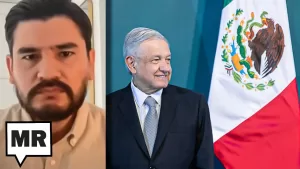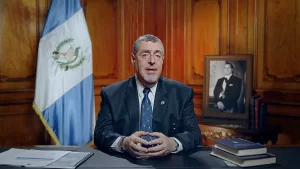Peoples Dispatch
Today, on April 29, thousands of Colombians are on the streets once again across the country. They have shut businesses, blocked roads and paralyzed traffic in rejection of the far-right government of president Iván Duque and its new neoliberal tax reform bill, the Sustainable Solidarity bill, which seeks to make the working class pay for the fiscal deficit incurred due to the COVID-19 pandemic. After the success of yesterday’s 24-hour-long national strike and peaceful nationwide mobilizations, the National Strike Committee, which brings together a diverse group of social organizations and trade unions, late at night, called on the citizens and workers to continue the protest actions for one more day, on the following day.
Yesterday, on April 28, under the banner of “For Life, Peace, Democracy and Against Duque’s Neoliberal Package and the Tax Reform”, thousands of workers, peasants, teachers, students, doctors, women, Indigenous and Afro-descendant communities as well as the members of the opposition left-wing political parties participated in the national strike and mobilized throughout the national territory to demand the withdrawal of the reform. Massive marches were held in the capital city Bogota as well as in the cities and towns of Barranquilla, Bucaramanga, Cali, Cantagallo, Cartagena, Chiquinquirá, Cúcuta, Duitama, Medellín, Neiva, Pereira, Puerto Boyacá, Soatá, Sogamoso, Soraca, Saravena, Tibú, Tunja and Villavicencio, among many others.
The workers and members of social organizations organized blockades of major highways and roads across the country, starting early in the morning. In Bogota, at least 50 sites remained closed due to rallies or blockades. In the Cauca department, the peasant communities of El Cairo and Cajibío blocked the Pan-American highway at several points. In the Valle de Cauca department, in the city of Cali, a group of Indigenous protesters knocked down the statue of the Spanish conqueror Sebastián de Belalcázar. Thousands of people also took to social media networks to express their disapproval of the national government and its neoliberal measures.
Throughout these protests, the demonstrators also denounced the government’s mishandling of the COVID-19 pandemic, the increase in coronavirus cases and the deaths due to the disease, the lack of anti-COVID-19 vaccines, the rampant unemployment and growing poverty in the country. They also demanded that the government implement effective measures to stop the systematic assassination of social leaders, human rights defenders and former combatants of the Revolutionary Armed Forces of Colombia (FARC) guerilla group, as well as femicides in the country.
“I strike because in Colombia we have a bad government, which is deeply undemocratic, repressive, and in favor of the international banks,” Francisco Maltés, the president of the Central Union of Workers (CUT) told Colombia Informa.
Despite the peaceful nature of the mobilizations, the security forces repressed the demonstrators in different parts of the country, including Bogota. The officials of the national police and the Anti-Disturbance Mobile Squadron (ESMAD) used tear gas and extreme force against peaceful protesters. Dozens of protesters were injured and dozens of others were arrested.
In Cali, at least one protester died during brutal police repression. Despite the unfortunate incident, the government authorities, the conservative sectors and the main-stream media continued with their policies of stigmatization and criminalization of social protests, and tried to discredit the national strike. The mayor of Cali decreed a curfew in the city, closing public transport and allowing militarization of the city.
According to a report from the Campaign Defend Liberty, during Wednesday’s protest at least 49 people were injured, 73 detained, 14 raids were carried out, 10 human rights defenders were attacked, 78 complaints of police violence were registered, and 4 people were reported to have been killed during the repression in different cities.
The National Strike Committee as well as the country’s trade union center, the Unitary National Command, rejected the incidents of police repression and the attempts to disgrace the strike. In the view of the state aggression and the ruling of the Administrative Court of Cundinamarca that suspended the constitutional right to public protest of the Colombians on April 28 and May 1 due to the pandemic, the organizations declared that the peaceful anti-government demonstrations will continue on Labor Day, on May 1. They also gave the call for another national strike on May 19, and warned that the strikes and mobilizations will continue until the government revokes the anti-people reform.
The Sustainable Solidarity bill was presented to the Congress by finance minister Alberto Carrasquilla on April 15, as a tool to allegedly alleviate poverty in the midst of the health and economic crisis. In the name of solidarity, the government seeks to pass a tax reform that increases the VAT on staple goods, fuel, and various public services; expands the tax collection base; increases the tax on agricultural inputs; increases the tax on pensions; freezes the wages in the public sector until 2026; eliminates subsidies on various public services; imposes toll tax on roads connecting countrysides with cities; among other measures.
The trade unions and social organizations denounced it as a hard blow to the middle class and stressed that it threatens the economic stability of workers, pensioners, and people with lower incomes, and will only increase poverty and inequality in the country. They also denounced that the reform is only meant to please the international financing agencies such as the IMF “to continue with the policy of unbridled indebtedness.”
(Peoples Dispatch is an international media organization with the mission of highlighting voices from people’s movements and organizations across the globe.)




